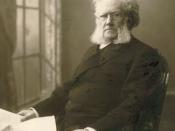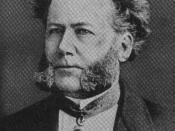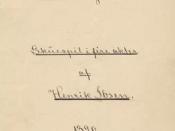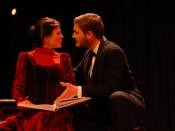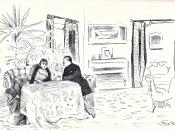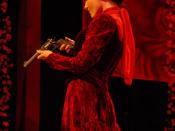Social and political experiences can influence the way in which a reader constructs meaning, and I thoroughly agree with this statement. Social and political experiences affect the way in which we interpret and construct meaning in life, just as much as in stage dramas. This is evedent through 2 main socially and politically constructed viewpoints, humanistic and feministic views.
Humanists cannot be stated as 'this is what they all believe', because just like life, nothing is that simple. However they can be generalised as people who believe that everything is fine the way it is, with women being deprived of power, fulfilling their lives in the role of a housewife and caretaker of the children, and men being the head of the house, with the jobs, ownership of all the goods and everything else. Humanists, generally, cannot understand why a women isn't happy at home, with the children, cooking, cleaning, washing, drying and all of the other jobs.
This is due to their social and political upbringing. They have been brought up in a humanistic environment. Possibly with a father that has told them that women are to cook and clean, not work, and this only aids there humanistic views. It is through this that the child grows up to be a humanistic person. An example of how a humanist would read Hedda Gabbler is where Hedda shoots herself. The humanist would say that she was a crazy women who was spoilt and always got everything that she wanted, and when she didn't get the power she was hungering for, she resorted to drastic measures, killing herself. This understanding of the context of the stage drama is also backed up for the Humanist when Hedda talks to Eilert Loevborg at the end of act 3.
"Hedda: (takes a step towards him) Eilert Loevborg, listen to me. Do it - beautifully! Loevborg: Beautifully? (Smiles). With a crown of vine leaves in my hair? The way you used to dream of me - in the old days? Hedda: No. I don't believe in that crown any longer. But - do it beautifully, all the same. Just this once. Good-bye. You must go now. And don't come back" This display proves to the humanistic viewer that Hedda wishes to cause others pain, take what she wants and generally cause trouble because she can't have everything that she wishes to.
A feminist can be classified as a person who believes that women should be given exactly the same rights, responsibilities and power a man should. Since Ibsen himself was a feministic this stage drama has been made to support the views of feminism. This is shown throughout the entire novel, but it is through the ending that Ibsen truly puts forth his views. In the end of this stage drama, Ibsen has Hedda Gabbler kill herself with one of her pistols. Everything in this scene has been well thought so that the audience receive the impact and views that Ibsen wants them to. The way that Hedda has killed herself, with her pistol, displays to the audience, 2 main things. Firstly the fact that she has done something that she deems as 'beautiful,' which she states while talking to Judge Brack, Mrs Elvsted and George Tesman.
"Hedda: (loud and clearly). Thank God! At last! Tesman: (appalled). For god's sake, Hedda, what are you saying? Hedda: I am saying that there is beauty in what he has done.
Brack: Hmm - Mrs Tesman Tesman: Beauty? Oh but I say! Mrs Elvsted: Hedda, how can you talk of beauty in connexion with a thing like this? Hedda: Eilert Loevborg has settled his account with life. He's had the courage to do what - what he had to do.
It is in these few lines that we can associate Hedda's lack of true action, with allowing for others to compensate for her lack of will to totally rebel against the system that she claims to hate. This is shown when Hedda states: "Oh no. I'm much to afraid of scandal." Also the final line in the book shows how very little Hedda actually changed anything at all: "Brack: Good God! People don't do such things!" This quote alone can show us very little of an impact Hedda has actually made, and how she has failed to change the views of anyone around her. This is done upon the saying that 'One can only challenge the views of men & women by society, not break or shatter them.' Through the stage drama, Hedda Gabbler, Ibsen is able to put forth his ideology and views, and it is only through social and political experiences in life, thus far, that allows us to make our own understanding of the stage drama. The humanist seeing Hedda as an evil woman who was a spoilt child and was generally out to cause trouble. The feminist's understanding of the stage drama is the opposite of that to the humanist, as they were, most likely brought up in the opposite way. The feminist was brought up to believe that women have as much rights to power, authority and ownership of goods, and it is due to these social and political experiences, that the feminist can understand that Hedda Gabbler was standing up for her rights, that she was trying to escape from the life forced upon her. A feminist views Hedda's death as her 'last stand' her finale, her last act of courage and freedom. This shows how we construct meaning due to our social and political experiences, and how very different those views can be, and although I have label the audience to Hedda Gabbler in to two categories, these are not set and there is people who are in the middle, all due to the way in which the audience has been brought up, socially and politically.
